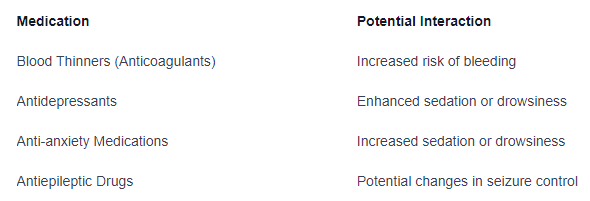What Is THC? Benefits, Risks, Side Effects

Understanding THC
THC, or delta-9-tetrahydrocannabinol, is the primary psychoactive compound found in cannabis. It is responsible for the euphoric effects commonly associated with marijuana use. To understand the benefits, risks, and side effects of THC, it is important to have a clear understanding of what THC is and how it works.
What is THC?
THC is a natural compound found in the resinous glands of the cannabis plant. It belongs to a group of compounds known as cannabinoids, which interact with the body's endocannabinoid system. THC is most commonly associated with marijuana, but it can also be found in other cannabis products such as hashish and concentrates.
When consumed, THC binds to cannabinoid receptors in the brain and central nervous system, specifically the CB1 receptors. This interaction leads to various physiological and psychological effects, including the feeling of being high or stoned. The potency of THC can vary depending on the strain of cannabis and the method of consumption.
How Does THC Work?
THC works by mimicking the effects of the body's natural cannabinoids, which are involved in regulating various bodily functions. The endocannabinoid system plays a role in modulating pain, mood, appetite, and sleep, among other functions. THC interacts with the CB1 receptors in the endocannabinoid system, altering the release of neurotransmitters and affecting the overall functioning of the body.
By binding to CB1 receptors, THC can produce a range of effects, including relaxation, pain relief, and changes in perception. These effects can vary depending on the individual and the dose consumed. It is worth noting that THC has a biphasic effect, meaning that low to moderate doses may produce desired effects, while higher doses can lead to adverse effects.
Understanding the basics of what THC is and how it works provides a foundation for exploring its benefits, risks, and side effects. By delving into the scientific aspects of THC, we can gain a better understanding of its impact on the body and mind.
Benefits of THC
THC, or delta-9-tetrahydrocannabinol, is the primary psychoactive compound found in cannabis. While THC is primarily known for its psychoactive effects, it also offers several potential benefits. Let's explore some of the potential benefits of THC:
Pain Relief
One of the most well-known benefits of THC is its ability to provide pain relief. THC interacts with the body's endocannabinoid system, which plays a crucial role in regulating pain perception. By binding to cannabinoid receptors in the brain and throughout the body, THC can help reduce pain sensations.
Studies have shown that THC may be effective in alleviating pain associated with various conditions, including chronic pain, neuropathic pain, and pain caused by inflammatory conditions such as arthritis. However, it's important to note that the effectiveness of THC for pain relief may vary from person to person.
Reduction of Nausea and Vomiting
THC has long been recognized for its antiemetic properties, making it useful for reducing nausea and vomiting. This is particularly beneficial for individuals undergoing chemotherapy or experiencing nausea associated with certain medical conditions.
By interacting with cannabinoid receptors in the brain's vomiting center, THC can help suppress the urge to vomit and alleviate feelings of nausea. This can significantly improve the quality of life for individuals undergoing medical treatments or dealing with chronic nausea.
Appetite Stimulation
THC is also known for its ability to stimulate appetite, commonly referred to as the "munchies" effect. This can be beneficial for individuals who have a reduced appetite due to various medical conditions or treatments.
Research suggests that THC can interact with specific receptors in the brain's hypothalamus, increasing the release of appetite-stimulating hormones. This can lead to an increased desire to eat and help individuals maintain a healthy weight.
Potential Benefits of THC
Pain Relief
Reduction of Nausea and Vomiting
Appetite Stimulation
It's important to note that the benefits of THC may vary depending on individual factors and the specific medical condition being addressed. Furthermore, the use of THC for medicinal purposes should always be discussed with a healthcare professional to ensure proper dosing and to consider any potential risks or side effects.
Risks and Side Effects of THC
While THC may offer certain benefits, it's important to be aware of the potential risks and side effects that can come with its use. Understanding these factors can help individuals make informed decisions about their THC consumption.
Impaired Cognitive Function
One of the primary risks associated with THC is its potential to impair cognitive function. THC affects certain areas of the brain responsible for memory, attention, and decision-making. This can lead to difficulties in concentration, learning, and problem-solving.
Impaired Cognitive Function
Difficulties in concentration
Impaired learning
Decreased problem-solving abilities
It's crucial to exercise caution when using THC, especially if engaged in activities that require mental alertness, such as driving or operating machinery. Individuals with pre-existing cognitive impairments or mental health conditions should consult with a healthcare professional before using THC.
Increased Heart Rate
Another side effect of THC is an increased heart rate. THC can cause temporary dilation of blood vessels and an elevation in heart rate, which may be concerning for individuals with underlying cardiovascular conditions.
Increased Heart Rate
Temporary dilation of blood vessels
Elevated heart rate
Individuals with heart problems or a history of cardiovascular issues should consult with a healthcare professional before using THC. It's important to monitor heart rate and seek medical attention if any severe symptoms arise.
Potential for Dependency
THC has the potential to lead to dependency or addiction, especially with frequent or long-term use. Some individuals may develop a psychological craving for THC, and continued use can result in withdrawal symptoms upon cessation.
Potential for Dependency
Psychological craving
Withdrawal symptoms
While not everyone who uses THC will develop a dependency, it's essential to be mindful of one's usage patterns and potential addictive tendencies. If you or someone you know is struggling with THC dependency, seeking professional help and support is advised.
Understanding the risks and side effects associated with THC is crucial for making informed decisions about its use. It's important to consider individual factors such as pre-existing health conditions, mental health history, and personal susceptibility to addiction. By being aware of these risks, individuals can use THC responsibly and prioritize their overall well-being.
Considerations for THC Use
Before considering the use of THC (tetrahydrocannabinol), it's important to be aware of various factors that should be taken into consideration. These include legal considerations, dosing and administration, and potential interactions with medications.
Legal Considerations
The legality of THC varies depending on the jurisdiction. While some regions have legalized the medical and/or recreational use of THC, it remains illegal in others. It's essential to familiarize yourself with the laws and regulations in your specific location to ensure compliance. Consult with local authorities or legal professionals for accurate and up-to-date information regarding the legal status of THC in your area.
Dosing and Administration
Proper dosing and administration are crucial when using THC. The appropriate dosage can vary depending on factors such as individual tolerance, desired effects, and the method of administration. It is recommended to start with a low THC dosage and gradually increase it if necessary. This allows you to assess your tolerance and determine the optimal dose for your needs.
The table below provides a general guideline for THC dosing:

It's essential to note that individual responses to THC can vary, and the effects may be influenced by factors such as body weight, metabolism, and overall health. Always consult with a healthcare professional or a qualified cannabis specialist to determine the appropriate THC dosage for your specific circumstances.
Potential Interactions with Medications
When considering THC use, it's important to be aware of potential interactions with other medications. THC can interact with certain drugs, including prescription medications and over-the-counter drugs. These interactions may impact the effectiveness and safety of both THC and the other medications.
The table below provides examples of potential drug interactions with THC:

It's crucial to inform your healthcare provider about any medications you are currently taking to ensure they are aware of the potential interactions with THC. They can provide guidance on whether THC is safe and appropriate for you, considering your specific medication regimen.
By considering legal aspects, understanding proper dosing and administration, and being aware of potential medication interactions, individuals can make informed decisions regarding the use of THC. Consulting with healthcare professionals or cannabis specialists can provide further guidance and ensure safe and responsible THC use.
Understanding THC
To fully comprehend the benefits, risks, and side effects of THC, it is essential to gain a clear understanding of what THC is and how it works within the body.
What is THC?
THC, short for delta-9-tetrahydrocannabinol, is a chemical compound found in the cannabis plant. It is one of the many cannabinoids that interact with the body's endocannabinoid system, which plays a role in regulating various physiological functions.
THC is responsible for the psychoactive effects commonly associated with cannabis use. When consumed, it binds to cannabinoid receptors in the brain, affecting areas involved in cognition, mood, pain perception, and appetite regulation.
How Does THC Work?
Once THC enters the body, it interacts with the endocannabinoid system by binding to cannabinoid receptors, namely CB1 and CB2 receptors. CB1 receptors are primarily found in the brain and central nervous system, while CB2 receptors are more prevalent in immune cells and peripheral tissues.
By binding to these receptors, THC can modulate various physiological processes. It can influence neurotransmitter release, alter the perception of pain, and impact appetite and nausea regulation, among other effects.
The effects of THC can vary depending on factors such as the dose, route of administration, and individual sensitivity. Understanding these mechanisms helps to elucidate both the potential benefits and risks associated with THC use.
Conclusion
In conclusion, understanding THC is essential for making informed decisions about its use. While THC offers potential benefits such as pain relief, reduction of nausea and vomiting, and appetite stimulation, it also carries risks and side effects such as impaired cognitive function, increased heart rate, and the potential for dependency. By considering legal aspects, proper dosing and administration, and potential medication interactions, individuals can safely and responsibly use THC to prioritize their overall well-being.
As research into cannabis continues to advance, it's crucial to remain informed about the latest developments in this field. With a better understanding of THC's mechanisms and effects on the body and mind, individuals can make educated choices about their cannabis consumption.
